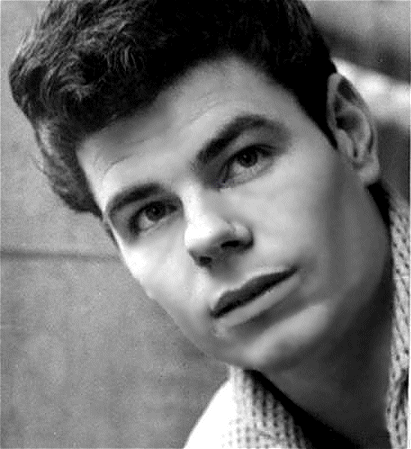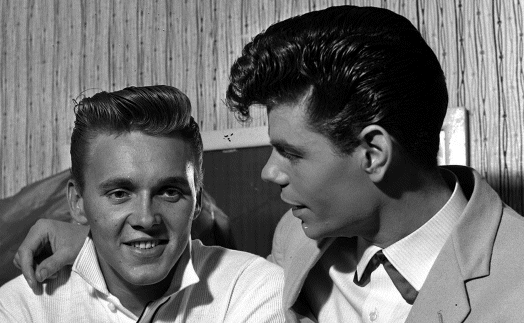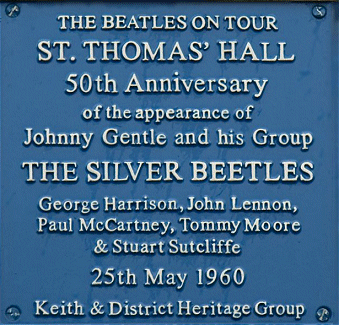Sixties
City presents
a wide-ranging series of
articles on all aspects of the Sixties, penned by the creator of the iconic
60s music paper Mersey
Beat
|
Sixties
City presents
a wide-ranging series of
articles on all aspects of the Sixties, penned by the creator of the iconic
60s music paper Mersey
Beat
|
|||||
|
| Even prior
to the advent of the Mersey Sound, Liverpool had been supplying artists
in the popular music field for some time. When the official charts were
launched in Britain in the 1950s it was to see hits by Liverpool artists
such as Lita Roza, Michael Holliday and Frankie Vaughan. Impresario Larry
Parnes was to sign three Merseyside singers - Billy Fury, Lance Fortune
and Johnny Gentle. Johnny was born John Askew on December 8th 1936 in a terraced house in Nightingale Square, off Scotland Road, Liverpool. He became an apprentice carpenter and in 1957 made his own guitar. He says, "I saw a woodwork magazine, which had an article on how to make a guitar in editions spread over three months. After I completed the guitar I took lessons to play. My tutor was amazed at the sound of my guitar. He always played it when I came for my lesson." He recalls, "Being an apprentice meant learning how to use your carpentry tools correctly, learning how to boat build and going to night school to learn the theory of carpentry. My best friends at school, Peter Reilly and Stan Phythian went into the army, although several lads I knew served apprenticeships at Harland & Wolff." He teamed up with Bobby Crawford and the two began making appearances at local social clubs. Johnny recalls, "We sang Everly Brothers songs, 'Bye Bye Love', 'Wake Up Little Susie', 'Bird Dog' etc and we would go to a club in Walton on Saturday afternoons and audition for the agents looking for acts for the working men's clubs, that's how we got our bookings." When his apprenticeship ended in 1958, Johnny became a ship's carpenter on a cruise liner. Following the initial voyage, he entered a talent competition at Butlin's under the name George Baker - but the contest was won by Jimmy Tarbuck. By that time John had changed his name again to Ricky Damone. He says, "I first changed my name to Ricky after Ricky Nelson and Damone because I thought it was show business sounding." He moved to London and worked on a building site while writing to record companies and agencies. He says, "After winning a competition at the Locarno Ballroom I was given some contacts in London by the band leader Jan Ralfini whose son worked for Pye Records. I wrote to Larry Parnes who gave me an audition with Philips Records and signed a contract for six records." When Larry Parnes decided to sign Johnny up he initially suggested that he call himself Tim McGhee. Johnny didn't like the name so Parnes said, "Your name is Johnny and you're a quiet guy - so how about Johnny Gentle?" Parnes also appointed him a tour manager - another famous Scouser: Hal Carter. Johnny's debut record was the self-penned 'Wendy', but it wasn't successful. He followed with 'Milk', but it only managed to reach No.28 in the charts. An EP 'The Gentle Touch' followed. In 1960 Parnes co-promoted an event with Liverpool coffee bar owner Allan Williams at Liverpool Stadium. Initially it was to have a bill topped by Eddie Cochran and Gene Vincent, but Cochran was killed in a road accident. With Vincent now topping the bill, Williams also featured local bands Cass & The Cassanovas, Rory Storm & The Hurricanes and Gerry & The Pacemakers. The event took place on 3rd May and Parnes saw the potential of the Liverpool bands and thought it might be a good idea to use one of them as a backing band for Fury and find others to back Duffy Power and Johnny Gentle on tours. An audition was held at the Wyvern Club in Liverpool on 10th May which resulted in The Silver Beatles being selected to back Johnny on his Scottish tour. Their fee was £120, which was to include their fares from Liverpool. At the time the group comprised John Lennon, Paul McCartney, George Harrison, Stuart Sutcliffe and Tommy Moore. Gentle, then twenty years old, has been quoted as saying, "When I first saw them I wondered what on earth Parnes had sent me." But he was later to deny he'd said this, claiming that he immediately liked their youth and enthusiasm. The tour began on 20th May 1960 at the Town Hall, Alloa, Clackmannanshire. Other gigs were on 21st May at the Northern Meeting Ballroom, Church Street, Inverness; on 23rd May at the Dalrymple Hall, Fraserburgh, Aberdeenshire; on 25th May at St Thomas's Hall, Keith, Banffshire; on 26th May at the Town Hall, Forres, Morayshire; on 27th May at the Regal Ballroom, Leopold Street, Nairn, Nairnshire and on 28th May at the Rescue Hall, Peterhead, Aberdeenshire. The group name was never actually used in the promotion of the tour, as the billing read 'Johnny Gentle and his group'. However, three members of the band decided to use stage names. Paul used the name Paul Ramon, George adopted the name Carl Harrison and Stuart called himself Stuart de Stael. It has been suggested that John called himself Johnny Silver, but he denied this. |
 |
 |
Johnny
first met the group half an hour before they were due to go on stage together
and they had time for only twenty minutes of rehearsals before their performance.
The promoter, Duncan McKinnon, wasn't impressed with the show but Johnny
explained that they needed rehearsal time together and, after practicing
the next day, the stage show improved. McKinnon had also complained about their stage gear, so Johnny gave George a black shirt to wear, as Paul and John were wearing black shirts. It was the nearest they got to a uniform appearance on stage. Johnny says, "Duncan was more like a farmer than a man who put on shows in dance halls. The repertoire for the Scottish tour was: Buddy Holly's 'It Doesn't Matter Anymore' and 'Raining in My Heart', Presley's 'I Need Your Love Tonight', Ricky Nelson's 'Poor Little Fool', Clarence Frogman Henry's 'I Don't Know Why I Love You But I Do', Eddie Cochran's 'Come On Everybody' and Jim Reeves' 'He'll Have To Go.' Johnny had a room to himself and The Silver Beatles shared two rooms. Sometimes they were put in different hotels. Johnny recalled the best hotel they stayed in was in Inverness, overlooking the river. It was while they were at the hotel that he played a song he'd written called 'I've Just Fallen For Someone' to George and John. Gentle was having difficulty with the middle eight and John came up with something he'd written which fitted in. Johnny decided to use Lennon's middle eight in his song and he actually recorded the number for Parlophone the following year under the name Darren Young. The record sold about 3,000 copies. Says John, "The middle eight words that John wrote to the song were: We know that we'll get by, Just wait and see, Just like the songs tell us, The best things in life are free. " He also gave the tune to the middle. "I recorded 'I've Just Fallen For Someone' as Darren Young, as a one-off as I was beginning to think that Johnny Gentle was not bringing me much luck record wise." Gentle was to say that, despite their rawness as a group, he was impressed with them and urged his manager to sign them up. However, Parnes specialised in representing solo singers and wasn't interested in the problems associated with managing bands. Parnes commented, "Johnny used to phone me virtually every night and say, 'Come up to Scotland and see these boys. I've given them a spot in my act and they're doing better than I am.' He was very honest, I always said that if I'd found the time to go up to Scotland he might have been the fifth Beatle. Who knows?" |
 |
|
Article
Text
UK
web hosting by
|